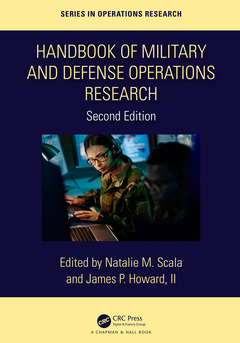Description
Handbook of Military and Defense Operations Research (2nd Ed.)
Chapman & Hall/CRC Series in Operations Research Series
Coordinators: Scala Natalie M., Howard, II James P.
Language: English
Subjects for Handbook of Military and Defense Operations Research:
· 17.8x25.4 cm · Hardback
Description
/li>Contents
/li>Readership
/li>Biography
/li>
Tracing its roots back to World War II, Operations Research (OR) has become a vital tool in military and defense strategy. The second edition of the Handbook of Military and Defense Operations Research highlights this evolution, showcasing how OR integrates with cutting-edge areas like artificial intelligence, cybersecurity, and big data analytics.
This edition is more than a historical account; it is a practical guide. The volume features expert voices and offers insights into OR applications in modern security challenges. Readers will discover a blend of theory and real-world case studies, making it an essential resource for both newcomers and seasoned defense analysis professionals.
Dive into this handbook to explore the rich, dynamic field of military and defense operations research, a discipline at the heart of global security and strategic decision-making.
New to the second edition:
- Re-organized into a three-part structure.
- Extensive revisions throughout.
- Numerous new exercises, examples, and case studies.
- Several new chapters.
Part I. Approaches. 1. Modern Data Analytics for the Military Operations Researcher. 2. Microsoft Excel: The Universal Tool of Analysis. 3. Military Decision Analysis. 4. Military Workforce Planning and Modeling. 5. Military Assessments. 6. Threatcasting in a Military Setting. 7. Analytical Modeling of Stochastic Systems. 8. Modern Methods for Characterization of Social Networks Through Network Models. 9. Process Optimization Through Structured Problem Solving. 10. Simulation Optimization. 11. Analytical Test Planning for Defense Acquisitions. 12: Influence Diagrams for Risk Management in Military and Defense. 13. Wavelet Methods for Time Series Forecasting. 14. Simulation Validation Literature Review. Part II. Applications. 15. A Model for and Inventory of Cybersecurity Values: Metrics and Best Practices. 16. Applying Information Theory to Validate Commanders’ Critical Information Requirements. 17. Modeling and Analysis of Army’s Sustainable Readiness Model Scheduling Problem. 18. Applying High Performance Computing Analytics for Understanding Weather Impacts on Installations. Part III. Soft Skills and Perspective. 19. Why Won’t They Use Our Model? 20. Lessons Learned from Military Fast Jet Life Support System Test Planning
Natalie M. Scala is an associate professor and director of the graduate programs in supply chain management in the College of Business and Economics at Towson University. She earned Ph.D. and M.S. degrees in industrial engineering from the University of Pittsburgh. Her primary research is in decision analysis, with specialization in military and security issues, including risk in voting systems, attack trees and strength of threat in mail voting, integrity of votes throughout the supply chain, poll worker education, and cybersecurity metrics and best practices. She co-directs the Empowering Secure Elections research lab, which defines threats to voting as systemic and an interplay between cyber, physical, and insider sources. Her work in elections security earned a University System of Maryland Board of Regents Award for Excellence in Public Service, the system’s highest faculty honor. In conjunction with Anne Arundel County, Maryland, her work in cybersecurity and threat training for poll workers received a U.S. Elections Assistance Commission Clearinghouse Award for Outstanding Innovation in Election Cybersecurity and Technology. Dr. Scala frequently consults to government clients and has extensive professional experience, to include positions with Innovative Decisions, Inc. / ITA International, the United States Department of Defense, and the RAND Corporation, as well as a faculty affiliation with the University of Maryland’s Applied Research Lab for Intelligence and Security. She is an associate editor for Military Operations Research and is a Past President of the Military and Security Society of INFORMS.
James P. Howard, II is a multifaceted professional with extensive experience in data science, consulting, teaching, and community service. He has previously worked as a consultant to various government agencies, including the Securities and Exchange Commission, the Executive Office of the President, and the Department of Homelan



